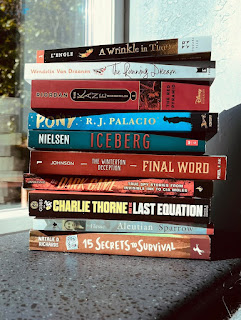Brittany Cavallaro wastes no time making her intentions clear—this is a Sherlock-and-Watson homage, and she owns it. Right there on the cover: “You’ve never seen Watson and Holmes like this before.” Right out there.
As someone who grew up watching Wishbone pay homage to Sherlock but never actually reading Conan Doyle's originals, I was intrigued.
Charlotte Holmes proved to be absolute chaos. She’s as brilliant, infuriating, and emotionally repressed as her literary ancestor, but also entirely her own person. Jamie Watson, on the other hand, is sweet, lost, and a little rough around the edges, which—if you’ve ever taught high school—makes him painfully relatable.
That said, I struggled a bit through this one. It often felt like the mystery took a back seat to Charlotte and Jamie’s personal dynamic. It was less solve the case! and more survive your soulmate! But the thing is… by the end, it all came together. The clues were there—cleverly and quietly nestled between tense banter. The big reveal had me mentally flipping back through chapters and going, “Ohhhh. That’s what that was.”
This book surprised me. I’m still not totally sold on all the relationship dynamics, but as far as mysteries go? It’s a brainy ride that doesn’t cheat the reader.



























